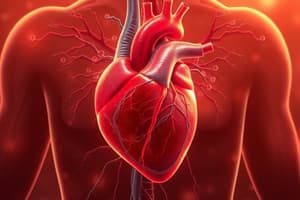Podcast
Questions and Answers
What are the three main types of blood vessels?
What are the three main types of blood vessels?
Arteries, veins, capillaries
What is the main function of red blood corpuscles?
What is the main function of red blood corpuscles?
Carrying oxygen from the lungs to the body's tissues
What is the role of platelets in the blood?
What is the role of platelets in the blood?
Play a role in blood clotting and preventing excessive bleeding
What are the four stages of the cardiac cycle?
What are the four stages of the cardiac cycle?
Why is it important to understand the circulatory system?
Why is it important to understand the circulatory system?
Flashcards are hidden until you start studying
Study Notes
Introduction
Transportation in human beings plays a crucial role in the proper functioning of various bodily processes. The primary function of this system is to transport essential nutrients and oxygen to different parts of the body while removing waste products and carbon dioxide. This process ensures the survival of cells and organs within the body. In humans, the transportation system consists mainly of the circulatory system, which includes the heart, blood vessels, and blood components. Let's delve deeper into how this complex system operates.
The Importance of Transportation Systems
Human beings require a transportation system to ensure the efficient delivery of oxygen and nutrients to cells throughout the body. These materials are necessary for cellular metabolism and growth. On the other hand, waste products such as carbon dioxide must be removed to maintain homeostasis within the body. The circulatory system serves this purpose effectively.
Components of the Circulatory System
The main components of the circulatory system include the heart, blood vessels, and various types of blood cells.
The Heart
The heart acts as a pump in the circulatory system, driving the circulation of blood throughout the body. It is approximately the size of a fist and has two sides separated by a septum to prevent mixing of oxygenated and deoxygenated blood. Each side contains chambers known as the left and right atria, followed by the left and right ventricles.
Blood Vessels
Blood vessels consist of three main types: arteries, veins, and capillaries. They play a key role in carrying blood to various parts of the body. Arteries are thick-walled vessels with deep seating and carry oxygen-rich blood away from the heart; they dilate to allow increased flow during physical activity. Veins are thinner-walled vessels with superficial location and carry oxygen-depleted blood back to the heart; they contract to aid in blood return. Capillaries are tiny vessels where exchange of nutrients, oxygen, and waste products occurs between the blood and surrounding tissues.
Blood Cells
The blood carries several types of cells, including red blood corpuscles, white blood corpuscles, and platelets. Red blood corpuscles, also known as erythrocytes, are responsible for carrying oxygen from the lungs to the body's tissues. White blood corpuscles, or leukocytes, are part of the immune system and help fight infections. Platelets, also known as thrombocytes, play a role in blood clotting and preventing excessive bleeding.
The Role of the Heart
The heart is responsible for pumping blood throughout the body, delivering oxygen and nutrients to cells and removing waste products. It does this by contracting and relaxing in a process called the cardiac cycle. The cardiac cycle consists of four stages: atrial systole, ventricular systole, atrial diastole, and ventricular diastole.
Conclusion
The transportation system in human beings is a complex network that ensures the proper functioning of various physiological processes. The circulatory system, comprised of the heart, blood vessels, and blood components, is responsible for carrying oxygen, nutrients, and waste products throughout the body. Understanding this system is crucial for maintaining health and well-being.
Studying That Suits You
Use AI to generate personalized quizzes and flashcards to suit your learning preferences.




